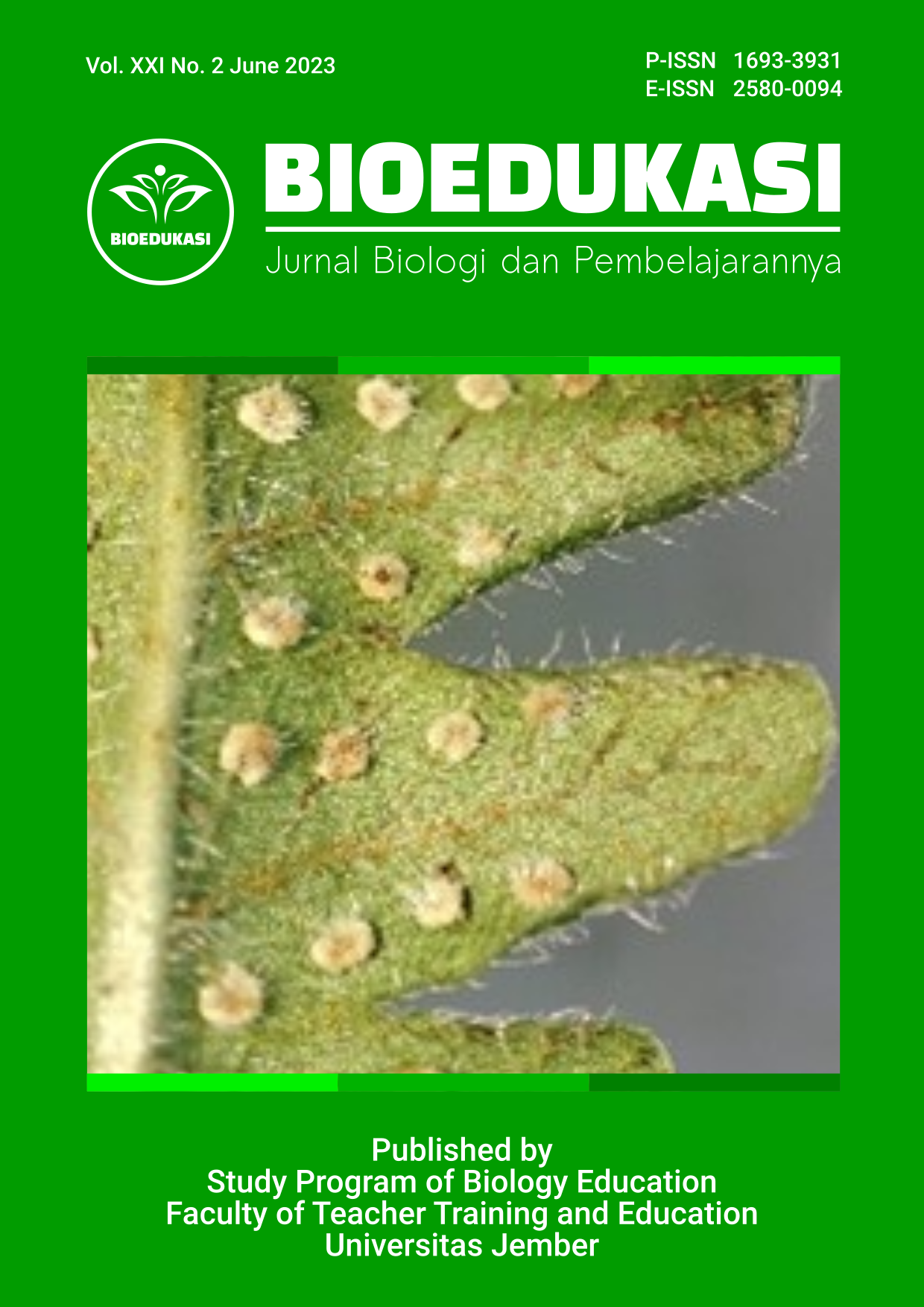Improving Undergraduate Students’ Argumentation Skills Through Problem-Based E-Module with Socio-Scientific Issues Topics
DOI:
https://doi.org/10.19184/bioedu.v21i2.39596Keywords:
Argumentation, E-module, Socio-Scientific IssuesAbstract
E-module is considered as an effective learning media to create an interactive learning environment. In spite of that it is rare to find the research that examines the development of e-module based on Problem-Based Learning model that integrates Socio-Scientific Issues on argumentation skills to students. This research aims to develop students’ argumentation skills through problem-based e-module with socio-scientific issues topics. The researcher used pre-experimental method with one-group-pretest-posttest design. The e-module was implemented to 36 students of Biology Education, State University of Malang, for the 2nd-year from November to December 2022. The research sample was selected by non-random sampling. The research samples were selected by non-random sampling. The research data were collected by opened-ended questions to assess the students’ argumentation skills and categorized based on the argumentation skills rubric. The data were analyzed based on the increase of pre-test and post-test scores by using Normalized Gain (N-Gain). The result of the N-Gain calculation showed a score of 0.46 which means the students’ argumentation skills developed in the moderate category after the implementation of using problem-based e-module with socio-scientific issues topics. The problem-based e-module with socio-scientific issues topics can train students to identify the problems, analyze data and evidence to give problem-solving solutions packaged of complex argumentation.
Downloads
References
Archila, P. A. (2014). Are Science Teachers Prepared to Promote Argumentation? A Case Study with Pre-Service Teachers in Bogotá City. Asia-Pacific Forum on Science Learning and Teaching, 15(1).
Braund, M., Scholtz, Z., Sadeck, M., & Koopman, R. (2013). First steps in teaching argumentation: A South African study. International Journal of Educational Development, 33(2), 175–184. https://doi.org/10.1016/j.ijedudev.2012.03.007
BSNP. (2014). Instrumen Penilaian dan Penelaahan Buku Teks. https://bntp.buku.kemdikbud.go.id/instrumen
Dawson, V., & Carson, K. (2017). Using climate change scenarios to assess high school students’ argumentation skills. Research in Science and Technological Education, 35(1), 1–16. https://doi.org/10.1080/02635143.2016.1174932
Dawson, V., & Carson, K. (2020). Introducing Argumentation About Climate Change Socioscientific Issues in a Disadvantaged School. Res Sci Educ, 50, 863–883.
Demiral, Ü., & Çepni, S. (2018). Examining argumentation skills of preservice science teachers in terms of their critical thinking and content knowledge levels: An example using GMOs. Journal of Turkish Science Education, 15(3), 128–151. https://doi.org/10.12973/tused.10241a
EL-Shaer, A., & Gaber, H. (2014). Impact of problem-based learning on student critical thinking dispositions, knowledge acquisition and retention. Journal of Education and Practice, 5(14), 74–85. http://www.iiste.org/Journals/index.php/JEP/article/view/12992/13308
Erduran, S., Simon, S., & Osborne, J. (2004). TAPping into argumentation: Developments in the application of Toulmin’s Argument Pattern for studying science discourse. Science Education, 88(6), 915–933. https://doi.org/10.1002/sce.20012
Fitriani, A., Zubaidah, S., Susilo, H., & Al Muhdhar, M. H. I. (2020). The effects of integrated problem-based learning, predict, observe, explain on problem-solving skills and self-efficacy. Eurasian Journal of Educational Research, 2020(85), 45–64. https://doi.org/10.14689/ejer.2020.85.3
Hake, R., & Reece, J. (1999). ANALYZING CHANGE/GAIN SCORES*†.
Hasnunidah, N., & Susilo, H. (2014). Profil Perspektif Sosiokultural Mahasiswa dalam Berargumentasi pada Mata Kuliah Biologi Dasar. Seminar Nasional XI Pendidikan Biologi FKIP UNS, 729–733.
Lee, W. W., & Owens, D. L. (2004). Multimedia-Based Instructional Design (Second Edi). Pfeiffer.
Lin, S.-S., & Mintzes, J. J. (2010). Learning argumentation skills through instruction in socioscientific issues: the effect of ability level. International Journal of Science and Mathematics Education, 8, 993–1017.
Malogianni, C., Luo, T., Stefaniak, J., & Eckhoff, A. (2021). An exploration of the relationship between argumentative prompts and depth to elicit alternative positions in ill-structured problem solving. Educational Technology Research and Development, 69(5), 2353–2375. https://doi.org/10.1007/s11423-021-10019-2
Nida, S., Rahayu, S., & Eilks, I. (2020). A survey of Indonesian science teachers’ experience and perceptions toward socio-scientific issues-based science education. Education Sciences, 10(2), 1–15. https://doi.org/10.3390/educsci10020039
Novita, R. D., Aminatun, T., & Daryono, R. W. (2022). E-Modules Through Flipped Classroom and PBL Models on Environmental Pollution Material to Increase Problem-Solving Ability. Journal of Education Technology, 6(4), 744–754.
Purwati, R., Suranto, Sajidan, & Prasetyanti, N. M. (2019). Problem-Based Learning Modules with Socio-Scientific Issues Topics to Closing the Gap in Argumentation Skills. TOJET: The Turkish Online Journal of Educational Technology, 18(4), 35–45.
Rebello, C. M., & Rebello, N. S. (2013). Transfer of argumentation skills in conceptual physics problem solving. AIP Conference Proceedings, 1513, 322–325. https://doi.org/10.1063/1.4789717
Rohayati, Y. T., Zubaidah, S., Mahanal, S., & Setiawan, D. (2020). The correlation between student scientific argumentation skills and cognitive achievement on PBL and RICOSRE learning models in biology classes. AIP Conference Proceedings, 2215. https://doi.org/10.1063/5.0000561
Roviati, E., & Widodo, A. (2019). Kontribusi Argumentasi Ilmiah dalam Pengembangan Keterampilan Berpikir Kontribusi Argumentasi Ilmiah dalam Pengembangan Keterampilan Berpikir Kritis. Titian Ilmu: Jurnal Ilmiah Multi Sciences, 11(2), 56–66. https://doi.org/10.30599/jti.v11i2.454
Setiawati, I., & Nurlaelah, I. (2017). Analisis Profil Kemampuan Berargumentasi Guru dan Mahasiswa Calon Guru dalam Pembelajaran Biologi Menggunakan Model Toulmin’s Argumen Pattern (TAP) dan Upaya Perbaikannya. Quangga: Jurnal Pendidikan Dan Biologi, 9(1), 7–17.
Topçu, M. S., Foulk, J. A., Sadler, T. D., Pitiporntapin, S., & Atabey, N. (2018). The classroom observation protocol for socioscientific issue-based instruction: development and implementation of a new research tool. Research in Science and Technological Education, 36(3), 302–323. https://doi.org/10.1080/02635143.2017.1399353
Torres, N., & Cristancho, J. G. (2018). Analysis of the forms of argumentation of teachers in training in the context of a socio-scientific issue. Journal of Turkish Science Education, 15(1), 57–79. https://doi.org/10.12973/tused.10221a
Zeidler, D. L., & Nicholas, B. H. (2009). Socioscientific Issues: Theory and Practice. Journal of Elementary Science Education, 21(2), 49–58. https://doi.org/10.1001/jama.1915.02580140037017




 https://orcid.org/0000-0003-1920-0515
https://orcid.org/0000-0003-1920-0515